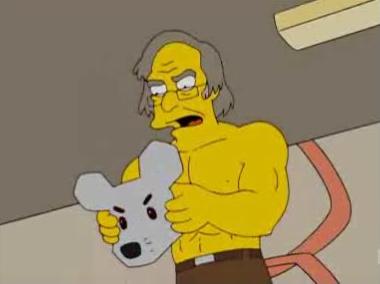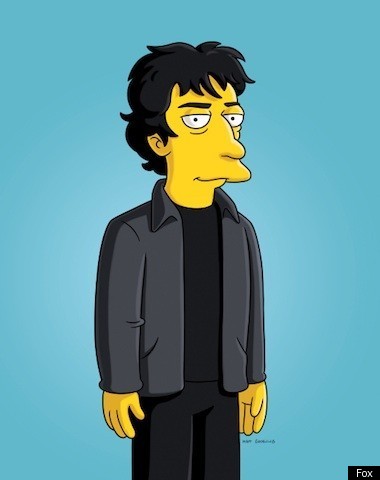
Art Sausage ««« 2014 »»» Wedding Invitations
04.06.14
-André Breton
Beauty will be CONVULSIVE or will not be at all
An Evening with Art Spiegelman and Neil Gaiman

| |
|
|
"Horror comics were a secular Jewish response to Auschwitz," said Art Spiegelman, author of Maus, Maus II, In the Shadow of No Towers, and many illustrations (including, to my surprise, Garbage Pail Kids and Wacky Packages). Spiegelman has been called the father of the graphic novel, though he said he would like a blood test.
The core of the conversation comes from Spiegelman, encouraged/prodded by Gaiman. For Neil, it seems nothing could be less interesting to him than the content of his head, since he has 24/7 access to it. Spiegelman, however, is a fount of new perspectives and stories for him, though they have plainly spent all day chatting amiably prior to sitting down on this stage in the Sosnoff Theater at Bard College, where Gaiman will soon begin teaching a handful of exceedingly fortunate students.
Gaiman began the talk by noting with joking envy that Spiegelman was made a superhero with his own catchphrase ("Maus is in the house!") when he appeared on "The Simpsons," whereas he was reduced to a bad guy. "An illiterate bad guy!" he added immediately with a laugh, as though villainy was well within his wheelhouse but he could not stand the taint of an inability to read.
Given Spiegelman's obvious affiliation with the comic medium, the majority of the conversation leaned in that direction at the goading of Gaiman's curiosity (though Spiegelman had slides to project from his laptop for visual reference of most questions Gaiman asked, so it was a rehearsed curiosity). Spiegelman said that comics were almost a substitute parent for him. Batman comics taught him to read in order to decipher the squiggles over these confusing pictures, Archie taught him gender relations.

| |
|
|
Comics are an alternative to the dreaded "easy reader" books. "I saw one that has this gorgeous picture of the princess and under it, it said, 'Cinderella is beautiful.' I know that. I can see that with my own eyes. Tell me something in the squiggles that I can't see in the pictures." Spiegelman and Gaiman seem to especially deride these books because they commit the sin of being boring and, worse, that they represent the sort of books that are forced on kids in school. To this day, Spiegelman hates George Eliot because he was made to read one of hers. Simply put, one hates what one is forced to read, but kids are rarely forced to read comics. Comics are guiltily acquired and read with flashlights beneath bed sheets. They have the illicit excitement of pornography without the sticky pages.
What truly shaped him, though, was Mad Magazine. Mad was created by William Gaines as a response to Fredric Wertham's crusade against indecency in the comic industry (Wertham published a book called Seduction of the Innocent, poorly sourced and largely fictional, on how comics led to rape, murder, and adolescent laziness. Wertham was not evil-he was called "Dr. Nickel" by his patients, otherwise uninsured and impoverished people whom he charged only a nickel a visit). Gaines, the publisher of a variety of horror comics, was called before a Senate subcommittee discussing the obscenity of the medium. He arrived early in the morning, full of pep and perhaps a few other stimulants. They did not call him to speak until well into the afternoon, at which point his fiery wit was sluggish and the comic industry was castrated. So he reacted by not calling Mad a comics, as it mostly was, but a magazine modeled after Time, which did not fall under the comic code.
According to Spiegelman, Mad teaches kids the importance of rereading. A single reading of a page isn't going to give the reader all the content. The letters may contain frescos that allude to Renaissance art or fart jokes more akin to The Canterbury Tales. As Gaiman intoned, he was aware of Superman from a Mad Magazine parody before he knew the character proper, so the DC Comics character has always bore the tinge of that initial mocking portrayal. More than that, to paraphrase Spiegelman, Mad always told you something true. It isn't cynical, but it insisted that one should question unearned authority. To reach young readers, "we have to be real. We have to understand what [kids] are living through."
The latter comment informed his work on Maus. Originally, his impetus for Maus was R. Crumb soliciting artists to create comics about animals. Spiegelman's idea was a parody of race relations in America, with big-lipped mice and Ku Klux Kats, but the idea couldn't take root. "I know nothing of the Black experience," he said. "Either I was going to come off as a liberal idiot or just another racist." Slowly, Maus became about the injustice he did know, the Holocaust. For those of you who haven't read it, it is a sensitive and deep portrayal of the death camps with the mice representing the Jewish, cats representing the Nazis, and pigs standing in for the Poles. The characters are rendered simply, allowing the reader to impose on them emotions. "I know a lot of Polish people who were not too happy to be portrayed as pigs," Spiegelman said, "but these are self-destructing metaphors. In the book, I have the mice wearing pig masks and a mouse and cat having a child who is sort of a mouse with cat stripes. They are meant to fall apart."
Spiegelman stated that, despite the common perception, comics are not about drawing and prose. They are graphic design and poetry, both a matter of making the most of the limitations of the space and medium. It is all about compression.
As a medium, Spiegelman believes comics are gaining a legitimacy they previously lacked. He is no fan of the traditional superhero genre, which reek of corporate censorship and safety, kowtowing to the comic code. People are willing to admit to writing comics now (Gaiman won the Hugo Award for a section of his Sandman series, which caused the Hugo Award Committee to dash about flustered as they attempted to revise their rules; Spiegelman's Maus II won the Pulitzer). In his words, "People who read and write comics can now get dates."
To a party curious about his advice to young writers, Spiegelman quotes a letter Edgar Allen Poe wrote: "I would say to you, without hesitation, aspire. A literary reputation, it is true, is seldom worth much when attained - for by this time the appetite for applause is sated - but in the struggle for its attainment is the true recompense. You are young, enthusiastic, and possess high talents. You will not fail of success. Be bold - read much - write much - publish little - keep aloof from the little wits, and fear nothing."
Soon in Xenology: Wedding planning. The perils of poverty. Praise and negotiation. Knowing murderers.
last watched: Oscar's Story
reading: Palm Sunday
listening: Lorde
Art Sausage ««« 2014 »»» Wedding Invitations
Thomm Quackenbush is an author and teacher in the Hudson Valley. He has published four novels in his Night's Dream series (We Shadows, Danse Macabre, Artificial Gods, and Flies to Wanton Boys). He has sold jewelry in Victorian England, confused children as a mad scientist, filed away more books than anyone has ever read, and tried to inspire the learning disabled and gifted. He is capable of crossing one eye, raising one eyebrow, and once accidentally groped a ghost. When not writing, he can be found biking, hiking the Adirondacks, grazing on snacks at art openings, and keeping a straight face when listening to people tell him they are in touch with 164 species of interstellar beings. He likes when you comment.